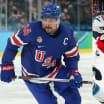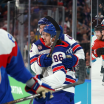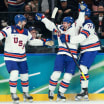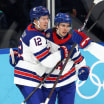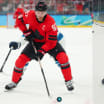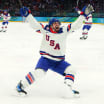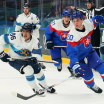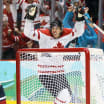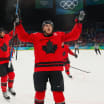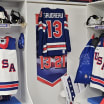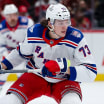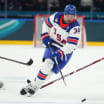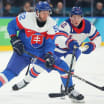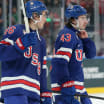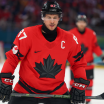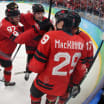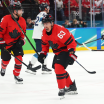SAN JOSE -- Sidney Crosby was still leading through the chaos long after NHL Commissioner Gary Bettman handed him the Conn Smythe Trophy and then the Stanley Cup.
Crosby was calling for teammates, telling them to grab their family members and pointing them in the direction of the Stanley Cup, which he placed on the ice, a short distance away from the Zamboni entrance.
Crosby wins Conn Smythe Trophy
Penguins captain had 19 points during Stanley Cup Playoffs to earn MVP
Here was Crosby, fresh off of the Pittsburgh Penguins' 3-1 championship-clinching win against the San Jose Sharks in Game 6 of the Stanley Cup Final at SAP Center on Sunday, orchestrating photo ops for his teammates and their moms and dads, wives or girlfriends, sisters and brothers, uncles and aunts.
This was moments after Crosby got the nod as the best player in the 2016 Stanley Cup Playoffs, winning the Conn Smythe Trophy in a vote by select members of the Professional Hockey Writers' Association after finishing the postseason with 19 points (six goals, 13 assists) in 24 games.
"There's so many guys who contributed," Crosby said. "I look at this as a total team effort. I just tried to work hard every night, do my job just like everyone else. I don't know if I did anything different or specific; I think everyone just competed, everyone tried to do what's expected of them, tried to play their role. If you do that every night you have a pretty good chance of winning."
Crosby didn't lead the Penguins in scoring this postseason; that was right wing Phil Kessel with 22 points (10 goals, 12 assists). But ask anybody around the Penguins and they will tell you Crosby led in every other category, regardless if you could put a number on it or not.
"He's our leader," Penguins left wing Conor Sheary said. "If he's not scoring goals or putting up points, he's our guy in the locker room. I know the Conn Smythe means the best player, and he's been our best player and he has been all year."
Crosby, though, did have some strong numbers.
Nineteen points in 24 games is nothing to scoff at. He had three points (all assists) in the Cup Final, but that's the same number of points Chicago Blackhawks captain Jonathan Toews had in the Cup Final when he won the Conn Smythe Trophy in 2010.
"He was our leader all the way through and he was great," right wing Patric Hornqvist said. "Maybe he didn't have the points he wanted to have, but he was our leader on and off the ice, and that's all that matters in the end. He's a winner and he made sure we won."
Crosby's last assist came on Hornqvist's empty-net goal at 18:58 of the third period Sunday. Crosby blocked Sharks defenseman Marc-Edouard Vlasic's shot, got the puck back, delivered it to Hornqvist, who did the rest to seal the championship.
"I'm going to remember that for a long time," Hornqvist said.
Crosby scored three game-winning goals against the Tampa Bay Lightning in the Eastern Conference Final, including one in overtime. He had eight points in the Penguins' five-game first-round series win against the New York Rangers.
He won 52.4 percent of his faceoffs and averaged 20:26 of ice time in the playoffs.
"His numbers don't indicate the impact he had on helping this team win, or the impact he had on a game-to-game basis," Penguins coach Mike Sullivan said. "He was a great leader for our team. It started by example with his performance and how he played. He's a complete player. He plays at both ends of the rink. He's a great faceoff guy. He kills penalties when we need him to. He plays in all the key situations. I could tell as we went through this postseason that he knew that our team had something special. He was going to will this thing."
It wasn't long ago when Crosby was wondering if he'd get another chance to will the Penguins to a Stanley Cup championship.
Problems with concussions robbed him of 101 games between 2011 and 2012. There was significant turnover within the organization after the 2013-14 season, when the Penguins blew a 3-1 series lead to the Rangers and lost in seven games.
Jim Rutherford replaced Ray Shero as the general manager. Mike Johnston replaced Dan Bylsma as coach.
The Penguins were a first-round bust last season.
One year later, the Penguins had a new coach and 10 players playing in the playoffs that were not on the team last season, including four rookies -- goalie Matt Murray, Rust, Sheary and Tom Kuhnhackl.
"It's not easy to throw a bunch of guys together and develop that chemistry, that trust," Crosby said. "It doesn't happen overnight. When you look at the group, how many new players we brought in, it was pretty special what we were able to do."
Crosby had to adapt to make it happen.
In 2009, when the Penguins had previously won the Stanley Cup, Crosby finished with 31 points, five fewer than Evgeni Malkin, who won the Conn Smythe Trophy that year. At that point, Crosby, then 21, had to be a major scorer because the Penguins didn't have the same type of depth they had this season.
He had plenty of help this time around.
The "HBK Line" featuring Carl Hagelin, Nick Bonino and Kessel took some of the pressure off of Crosby and finished with 56 points.
Malkin had 18 points. Hornqvist had 13, including nine goals. Kris Letang had 14. Chris Kunitz had 12. Bryan Rust scored six goals, including two in Game 7 against Tampa Bay.
In the Cup Final, the Penguins got goals from defensemen Ben Lovejoy, Ian Cole and Brian Dumoulin. Cole hadn't scored in 104 straight games before he scored in Game 4.
Nobody, though, could play Crosby's role. To his teammates, he's the heart and soul of the Penguins.
"He's a great leader," said retired Penguins forward Pascal Dupuis, who was on the ice in uniform for the Cup celebration. "Just the way he acts, the way he treats people, the way he wants to win every night, the way he handles himself around media, around anybody in the hockey world, I think you raise your hat to him."
Dupuis actually did raise his hat when he said that. Crosby couldn't see him do it; he was still orchestrating the photo ops, yet another sign of his leadership.
"He wears the 'C' for a reason," Sheary said.
